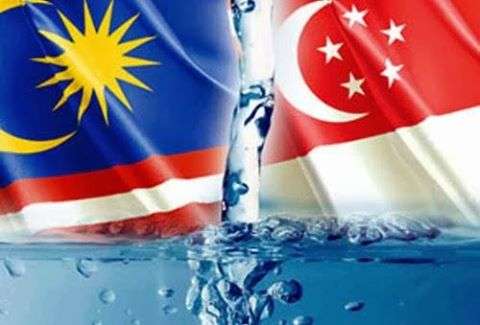THE importance of the water agreement between Singapore and Malaysia has come under renewed scrutiny following a statement by Malaysia’s Environment and Natural Resources Minister Nik Nazmi Nik Ahmad.
In a recent interview, he said that Malaysia is reviewing the water agreement with Singapore, which expires in 2061, and that the country is open to renegotiating the terms of the deal.
This statement is significant because it comes at a time when Malaysia is facing a number of water challenges, including climate change, population growth, and rapid development. These challenges are putting a strain on Malaysia’s water resources with some experts warning that the country could face a water crisis in the future.
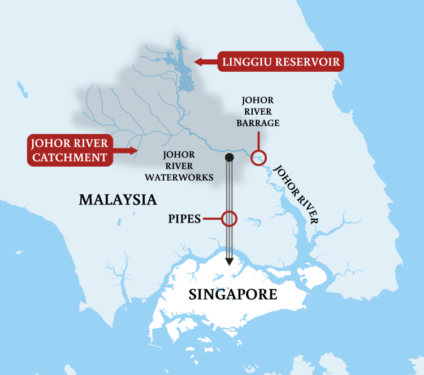
In light of these challenges, Nik Nazmi’s statement has raised questions about whether the current water agreement between Singapore and Malaysia is still fair and equitable.
Some Malaysians have argued that the agreement gives Singapore too much access to Malaysia’s water resources while others have argued that the agreement is essential for Singapore’s survival.
Water agreement history
The water dispute between Malaysia and Singapore has a long history. In 1910, the municipal leadership of Singapore and Sultan Ibrahim of the state and territories of Johor in neighbouring Malaya signed an agreement that allowed Singapore to rent land in Johor and use its water for free.
The Municipal Water Department of Singapore under David J. Murnane, began importing raw water from Gunong Pulai in 1927 and filtered water on Dec 31, 1929.
In 1961, Singapore and Malaysia signed a 100-year water agreement that guaranteed Singapore’s right to draw 250 million gallons of raw water daily from the Johor River at a price of 3 sen per thousand gallons. The agreement was due to expire in 2061.
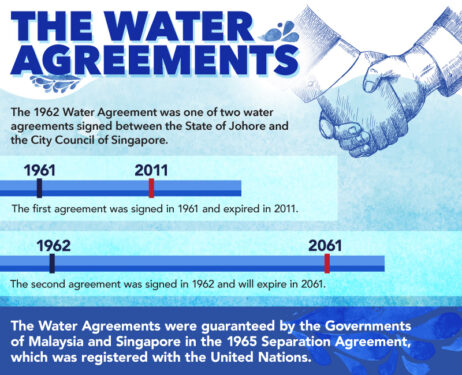
In 1965, Singapore separated from Malaysia. The Separation Agreement signed between Singapore and Malaysia on Aug 7, 1965 guaranteed the water agreements from 1961 and 1962 and granted Singapore rights to the use of water originating on the Malaysian side of the border till 2061.
Comparison with other world agreements
There are a number of other water agreements between countries around the world. Some of these agreements are similar to the Malaysia-Singapore water agreement while others are quite different.
For example, the Indus Waters Treaty between India and Pakistan is a complex agreement that governs the use of the Indus River basin. The treaty signed in 1960 has been largely successful in preventing conflict over water resources.
Another example is the Nile Basin Initiative which is a cooperative agreement between 11 countries in the Nile River basin. The initiative aims to promote sustainable water management and development in the basin.
In comparison to other water agreements, the Malaysia-Singapore water agreement is relatively simple. It is a bilateral agreement that guarantees Singapore’s right to draw a certain amount of water from the Johor River at a fixed price.
Beyond water issue
The water agreement between Singapore and Malaysia is more than just a water deal. It is also a symbol of the close relationship between both countries. The agreement has helped to maintain peace and stability in the region for over 50 years.
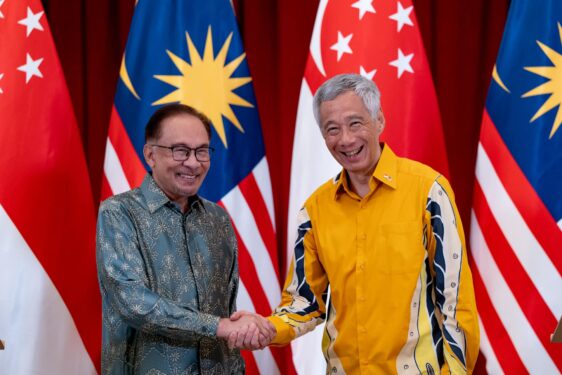
In addition, the agreement has brought significant benefits to both Singapore and Malaysia. Singapore has been able to secure a reliable source of water while Malaysia has earned billions of ringgit in revenue from the sale of water to Singapore.
The agreement has also led to close cooperation between the two countries on water management issues. Singapore has shared its expertise in water management with Malaysia that led to both neighbours having worked together on joint projects to improve water quality and efficiency.
Beyond its economic and environmental benefits, the water agreement has also played an important role in building trust and understanding between Singapore and Malaysia. The agreement has shown that the two countries can work together to resolve complex issues in a mutually beneficial way.
Flip of the coin
Nevertheless, the Malaysia-Singapore water agreement has been criticised by some Malaysians on a number of grounds. One criticism is that the price of raw water is too low. Malaysians argue that they are losing out on billions of ringgit in revenue by selling water to Singapore at such a low price.
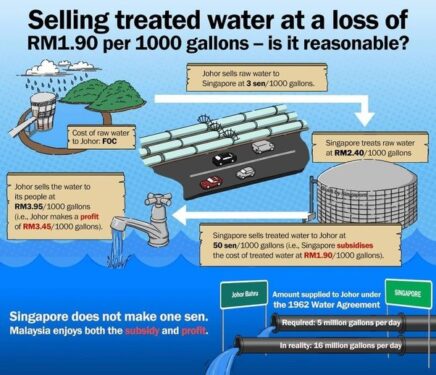
Another criticism is that the agreement is unfair to Malaysia as it does not take into account the country’s growing population and needs. Malaysians argue that they will eventually need more water for themselves and that the agreement should be renegotiated to reflect this.
On the other hand, Singapore has argued that the water agreement is fair and that it has been beneficial to both countries. They point out that Singapore has invested billions of dollars in developing water treatment facilities and that Malaysia has benefited from this investment. They also argue that the water agreement is essential for regional security and stability.
The water agreement between Singapore and Malaysia is a vital agreement for both countries. It is important to ensure that the agreement remains fair and equitable and that it continues to benefit both parties.
The agreement is also important for regional peace and stability. It is a symbol of the close relationship between Singapore and Malaysia, and that it has helped to build trust and understanding between both countries.
Water has been a source of conflict in many parts of the world but it can also be a force for peace. We cannot survive without water and neither can we thrive by fighting over it. When we work together to manage our water resources, we are also working together to build a better future for all of us.
Let us find the best way to resolve this. – Nov 4, 2023
Dr Ahmad Zaharuddin Sani Sabri is a former director at the Institute of Tun Dr Mahathir Thoughts.
The views expressed are solely of the author and do not necessarily reflect those of Focus Malaysia.
Main pic credit: unscrambled sg


